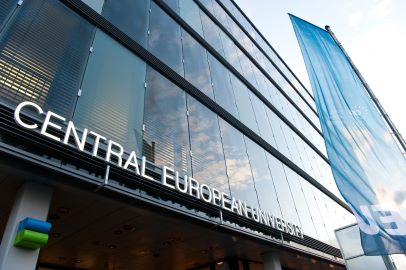The online symposium was hosted by the Department of Public Policy at the Central European University (CEU) in collaboration with Academia Europaea, Section “Economics, Business and Management Sciences” and the Global Labor Organization (GLO) as a part of the GLO Global Conference 2022.
Updated December 7, 2022.
- AE-CEU-GLO Labor Symposium: Format: online only, public
- Friday December 2, 2022 – 10.00 – 12.00 CET Berlin = Vienna time zone.
- Join Zoom Meeting
- Organizer & Chair: Martin Kahanec, CEU
Academia Europaea (AE) Section Economics, Business and Management Sciences is concerned with the many academic issues dealing with individual behavior up to institutions, small and national organizations, countries, and multinational structures. Recent topics covered among others are migration and identity; financial markets; regional economics; and climate change.
The AE-CEU-GLO Labor Symposium showcases some of the cutting-edge research in the areas of labor and population economics produced by section members as well as invited guests.
The symposium is dedicated to the memory of Jacques Drèze, a long-standing member of Academia Europaea (since 1989), who passed away on September 25, 2022.
Program:
- 10:00-10:05: Welcome by Martin Kahanec (Academia Europaea section chair and CEU)
- 10:05-10:30: Mandatory Wage Posting, Bargaining and the Gender Wage Gap
Rudolf Winter-Ebmer (Johannes Kepler University Linz)
- 10:30-10:55: Management Practices and Productivity: Does Employee Representation Play a Moderating Role?
Uwe Jirjahn (University of Trier) - 10:55-11:20: Strangers and Foreigners: Trust and Attitudes toward Citizenship
Graziella Bertocchi (Universita’ di Modena e Reggio Emilia)
- 11:20-11:45: Climate Variability, Female Empowerment, and Household Employment Decisions
Olga Popova (Leibniz Institute for East and Southeast European Studies)
- 11:45-12:00: Discussion and closing remarks
* * *
About Jacques Drèze
Jacques Drèze, a long-standing member of Academia Europaea (since 1989) passed away on Sunday, September 25, 2022, in Verviers at the age of 93.
Jacques inspired generations of economists, through his rigorous research (e.g. on economic uncertainty, general equilibrium theory, unemployment and disequilibrium economics), as a creator and director of the Center for Operations Research and Econometrics (CORE), initiator of the European Doctoral Program in Quantitative Economics (EDP), founding father of the European Economic Association (of which he served as the first President in 1985), and professor at Université Catholique de Louvain and Cornell University.
Jacques combined academic excellence with an open-door approach and empathy for the personal challenges of students and colleagues seeking his advice. He has been an exemplary role model for economists as well as economic policy professionals.
Jacques will be missed immensely.
The institutions
The Academia Europaea was established in 1988 and is the Pan-European Academy of Sciences Humanities and Letters. The object of Academia Europaea is the advancement and propagation of excellence in scholarship in the humanities, law, the economic, social, and political sciences, mathematics, medicine, and all branches of natural and technological sciences anywhere in the world for the public benefit and for the advancement of the education of the public of all ages in the aforesaid subjects in Europe. Academia Europaea is a European, non-governmental association acting as an Academy. Our members are scientists and scholars who collectively aim to promote learning, education and research. Founded in 1988, with more than 5000 members which includes leading experts from the physical sciences and technology, biological sciences and medicine, mathematics, the letters and humanities, social and cognitive sciences, economics and the law.
Department of Public Policy (DPP), Central European University
DPP is a multi-disciplinary and global public policy Department at the Central European University in Vienna aiming to create an educational experience that involves not only the acquisition of skills and knowledge but also the cultivation of a mindset that emphasizes social entrepreneurship, innovation, cultural awareness and a commitment to the public good. DPP offers four master’s degrees in public policy, and the public policy track of the Doctor of Philosophy in Political Science program. The Department boasts a team of outstanding resident faculty, world-class visiting faculty made up of top researchers, and practitioners in the public policy field who bring a wide array of academic and practical subjects to DPP’s diverse classroom.
Central European University (CEU) is a research-intensive university specializing in the social sciences, humanities, law, public policy and management. It is accredited in the United States, Austria and Hungary. CEU’s mission is to promote academic excellence, state-of-the-art research, research-based teaching and learning and civic engagement, in order to contribute to the development of open societies. CEU offers bachelor’s, master’s and doctoral programs and enrolls more than 1,400 students from over 100 countries. The teaching staff consists of resident faculty from over 50 countries and prominent visiting scholars from around the world. The language of instruction is English.
The Global Labor Organization (GLO) is a global, independent, non-partisan and non-governmental organization that has no institutional position. The GLO functions as an international network and virtual platform for researchers, policy makers, practitioners and the general public interested in scientific research and its policy and societal implications on global labor markets, demographic challenges and human resources. These topics are defined broadly in line with its Mission to embrace the global diversity of labor markets, institutions, and policy challenges, covering advanced economies as well as transition and less developed countries.
Ends;

